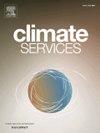实践中气候服务共同创造方法的类型
IF 4.5
3区 环境科学与生态学
Q2 ENVIRONMENTAL SCIENCES
引用次数: 0
摘要
共同创造被认为有助于弥合气候服务方面的科学创新与其在决策中的应用之间的差距。然而,对于实践中存在的不同类型的共同创造方法,它们是如何执行的,它们是如何弥合可用性差距的,以及在什么情况下它们是最有效的,人们的参与是有限的。本研究旨在描述实践中的气候服务共同创造,并开发类型学来探索它们如何弥合可用性差距。我们对33个案例进行了主题和理想类型分析,这些案例来自关键线人访谈和共同创造过程文档的内容分析。我们发现,i)共同创造方法非常强调气候信息(其可用性和有用性),以改善气候服务的使用;ii)共同创造在实践中偏离了理论方法;iii)除了其他背景因素外,共同创造的模式(研究和委托)对共同创造过程的执行有很强的影响。在实践中,我们提出了气候服务共同创造的三种类型;1)信息密集型(n = 21),与产生有用信息有关;Ii)功能使用密集型(n = 5),关注共同创建的信息在决策中的可用性;iii)以创新为导向(n = 7),关注在创新气候服务中嵌入新的见解。这项研究有助于在气候服务领域实施共同创造的研究人员和实践者了解存在的共同创造类型、与每种类型相关的风险以及每种类型可能影响气候服务使用的程度。本文章由计算机程序翻译,如有差异,请以英文原文为准。
Typologies of climate service co-creation approaches in practice
Co-creation is seen as instrumental in bridging the gap between scientific innovation in climate services and their use in decision-making. However, there has been limited engagement with the different types of co-creation approaches that exist in practice, how they are executed, how they bridge the usability gap, and in what situations they would be most effective. This study aims to characterise climate service co-creation in practice, and develop typologies to explore how they bridge the usability gap. We conducted Thematic and Ideal Type Analyses of 33 case studies developed from Key Informant Interviews and Content Analysis of co-creation process documents.
We show that i) co-creation approaches place a strong emphasis on the climate information (its usability and usefulness) to improve use of climate services, ii) co-creation in practice deviates from the theoretical approach, and iii) in addition to other contextual factors, the mode (research and commissioned) of co-creation has a strong influence on the execution of co-creation processes. We develop three typologies of climate service co-creation in practice; i) information-intensive (n = 21), concerned with producing useful information; ii) functional-use intensive (n = 5), concerned with the usability of the co-created information in decision-making; and, iii) innovation-oriented (n = 7), concerned with embedding new insights into innovative climate services.
This study benefits researchers and practitioners implementing co-creation in the field of climate services to understand the types of co-creation that exist, the risks associated with each type, and the level to which each type may influence the use of climate services.
求助全文
通过发布文献求助,成功后即可免费获取论文全文。
去求助
来源期刊

Climate Services
Multiple-
CiteScore
5.30
自引率
15.60%
发文量
62
期刊介绍:
The journal Climate Services publishes research with a focus on science-based and user-specific climate information underpinning climate services, ultimately to assist society to adapt to climate change. Climate Services brings science and practice closer together. The journal addresses both researchers in the field of climate service research, and stakeholders and practitioners interested in or already applying climate services. It serves as a means of communication, dialogue and exchange between researchers and stakeholders. Climate services pioneers novel research areas that directly refer to how climate information can be applied in methodologies and tools for adaptation to climate change. It publishes best practice examples, case studies as well as theories, methods and data analysis with a clear connection to climate services. The focus of the published work is often multi-disciplinary, case-specific, tailored to specific sectors and strongly application-oriented. To offer a suitable outlet for such studies, Climate Services journal introduced a new section in the research article type. The research article contains a classical scientific part as well as a section with easily understandable practical implications for policy makers and practitioners. The journal''s focus is on the use and usability of climate information for adaptation purposes underpinning climate services.
 求助内容:
求助内容: 应助结果提醒方式:
应助结果提醒方式:


